Choosing a powerful yet affordable and best laptop for big data and machine learning is crucial in today’s data-driven landscape. With data generated at an unprecedented rate, professionals need robust processing capabilities to execute complex computations and intricate algorithms seamlessly.
Effective data handling directly impacts the speed and efficiency of model training, data analysis, and simulation tasks. Selecting the right machine as the best laptop for big data and machine learning ensures smooth operation during intensive tasks, enhancing productivity by minimizing lag and preventing crashes. This focus allows you to concentrate entirely on your work.
Investing in the best laptop for big data and machine learning that meets the rigorous demands of these applications will lead to better project outcomes. The right hardware supports essential software tools and frameworks like TensorFlow, PyTorch, and Apache Spark, which require substantial computational power, ample memory, and fast storage solutions. With the best laptop for big data and machine learning, you can execute tasks faster and more efficiently, empowering you to derive insights and make data-driven decisions swiftly.
In this evolving field, the right laptop can make the difference between success and missed opportunities, making it imperative to find the best laptop for big data and machine learning that aligns with your specific needs.
Key Factors to Consider When Choosing the Best Laptop for Big Data and Machine Learning
When searching for the best laptop for big data and machine learning, several key factors significantly impact your ability to handle complex computations and manage extensive datasets effectively.
- Processing Power: A high-performance CPU is key for big data and machine learning laptops, enabling fast calculations and smooth analysis. Multi-core processors excel at parallel processing, essential for data-heavy tasks.
- Memory & RAM: Ample memory is crucial for handling large datasets, making 16GB of RAM the minimum requirement. However, 32GB or more is ideal for demanding tasks. This allows smooth multitasking without affecting performance.
- Storage: SSDs are a game changer for storage, offering much faster data access than traditional HDDs. The best laptop for big data and machine learning should use SSDs to reduce load times and boost productivity with large datasets.
- GPU: A dedicated GPU isn’t always necessary but is highly beneficial for deep learning and neural networks. The best laptop for big data and machine learning should have a strong GPU to speed up complex computations and improve model training efficiency.
- Battery Life: For remote data professionals, battery life is crucial. The best laptop for big data and machine learning should balance performance and longevity, enabling work on demanding tasks without frequent recharging.
By considering these factors, you can choose the best laptop for big data and machine learning that meets your specific needs and enhances productivity. All these factors are discussed in detail in the post below.
Top Laptops for Big Data & Machine Learning (2024)
When selecting the best laptop for big data and machine learning, it’s essential to consider models that excel in processing power, memory, storage, and GPU capabilities. Here are some of the top contenders for 2024 that meet these criteria:
1. Apple MacBook Pro M3 Max
The Apple MacBook Pro M3 Max is a powerhouse designed for professionals in the tech industry. With its cutting-edge Apple M3 Max chip, it delivers exceptional performance, making it ideal for handling large datasets and complex computations in a sleek and stylish package.
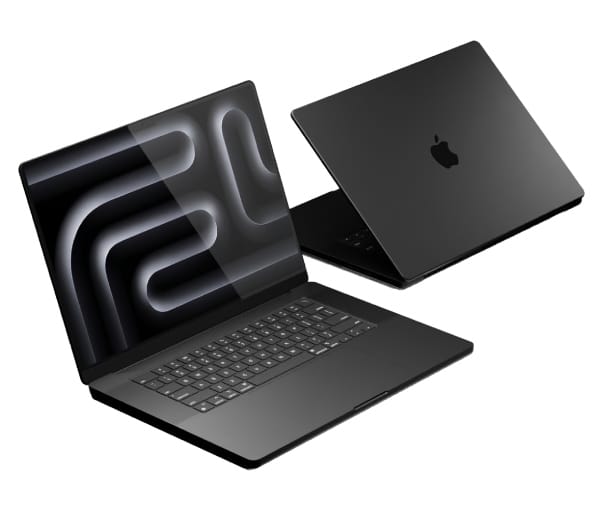
- Processor: Apple M3 Max chip with a 14-core CPU and up to a 40-core GPU, providing exceptional performance for demanding tasks.
- RAM: Up to 128GB of unified memory, ideal for handling very large datasets effortlessly.
- Storage: Options up to 8TB SSD, ensuring ample space for extensive data storage.
- Display: 16.2-inch Liquid Retina XDR display for stunning visuals and accurate color representation.
- Battery Life: Up to 24 hours, making it perfect for long working sessions.
- Pros: Powerful performance, long battery life, and a macOS environment optimized for developers.
- Cons: Expensive and limited to the macOS ecosystem, which might not suit all users.
2. Dell XPS 17
The Dell XPS 17 combines elegance with high performance, making it a favorite among data scientists and machine learning professionals. Its impressive specs and beautiful 17-inch display provide an immersive working experience, perfect for intensive data tasks.
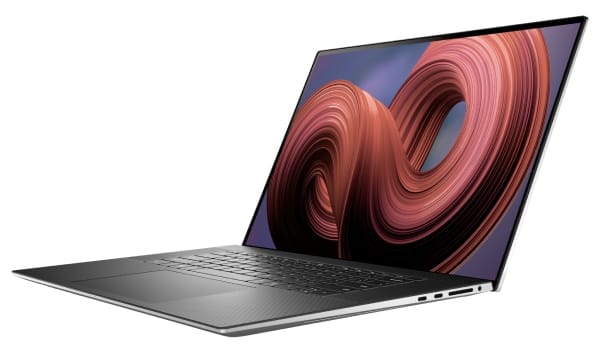
- Processor: 14th Gen Intel Core i9-14900H with 16 cores, delivering outstanding speed and efficiency.
- RAM: Up to 128GB DDR5, supporting multitasking and complex computations.
- Storage: Up to 4TB NVMe SSD, allowing for quick access to large files.
- GPU: NVIDIA GeForce RTX 5090, enhancing performance for machine learning tasks.
- Display: 17-inch UHD+ InfinityEdge touchscreen, offering ample screen real estate.
- Battery Life: Up to 15 hours, ideal for professionals on the go.
- Pros: Large display and excellent performance for big data and machine learning tasks.
- Cons: High price for top-tier configurations, which may not fit all budgets.
3. Lenovo ThinkPad P1 Gen 7
The Lenovo ThinkPad P1 Gen 7 is built for professionals who require military-grade durability and top-notch performance. With powerful components optimized for AI and deep learning, this laptop is a reliable choice for data-heavy workloads.
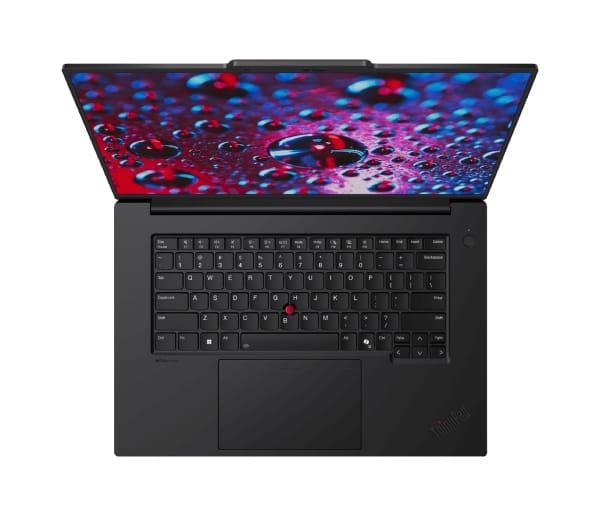
- Processor: Intel Core i9-14900HX with 24 cores and speeds up to 5.8 GHz, ensuring robust performance.
- RAM: Up to 128GB DDR5, suitable for extensive datasets.
- Storage: Up to 4TB PCIe SSD, providing quick data retrieval and storage.
- GPU: NVIDIA RTX 6000, optimized for AI and deep learning tasks.
- Display: 16-inch UHD+ (3840×2400) touchscreen for a vibrant visual experience.
- Battery Life: Up to 12 hours, balancing power and portability.
- Pros: Military-grade durability and professional-grade components tailored for demanding workloads.
- Cons: Heavier compared to other models, which may affect portability.
4. ASUS ROG Zephyrus G16
The ASUS ROG Zephyrus G16 is a gaming laptop that doubles as a robust tool for machine learning. Its powerful GPU and efficient CPU make it a solid choice for users looking for a balance between gaming and professional data analysis.
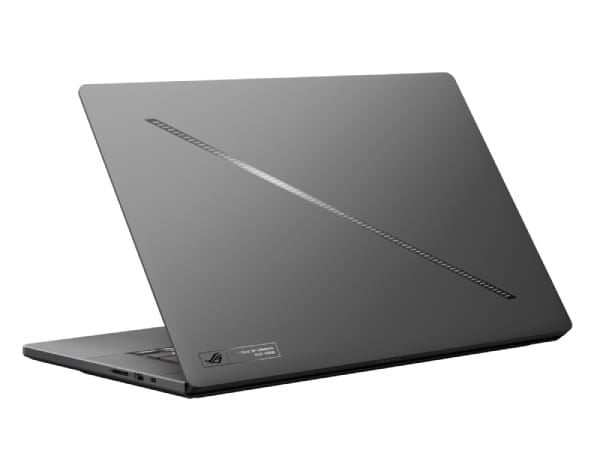
- Processor: AMD Ryzen 9 8950HS with 12 cores and 24 threads, offering exceptional processing capabilities.
- RAM: Up to 64GB DDR5, allowing for efficient multitasking.
- Storage: 2TB PCIe 4.0 NVMe SSD, ensuring rapid data access.
- GPU: NVIDIA GeForce RTX 5090, providing powerful graphics performance for deep learning.
- Display: 16-inch QHD+ (2560×1600) with a 165Hz refresh rate for smooth visuals.
- Battery Life: Up to 13 hours, making it suitable for long sessions.
- Pros: Powerful yet portable, with an excellent GPU for machine learning applications.
- Cons: Smaller screen sizes may not suit everyone’s preferences.
5. Microsoft Surface Laptop Studio 2
The Microsoft Surface Laptop Studio 2 is a versatile and innovative device designed for creatives and data professionals alike. With its unique design and solid performance, it offers flexibility for various tasks, from programming to data visualization.
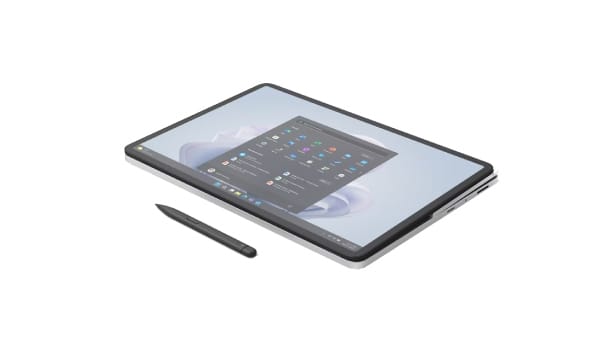
- Processor: Intel Core i7-14900H with 14 cores, reaching speeds of up to 5.2 GHz.
- RAM: Up to 64GB LPDDR5x, sufficient for moderate data analysis tasks.
- Storage: Up to 2TB SSD for efficient file management.
- GPU: NVIDIA GeForce RTX 4070, which is adequate for most machine learning tasks.
- Display: 14.4-inch PixelSense Flow Display with a 120Hz refresh rate, enhancing usability.
- Battery Life: Up to 20 hours, perfect for users who work remotely.
- Pros: Versatile form factor with touchscreen and stylus support, ideal for creative tasks.
- Cons: Less powerful GPU for heavy machine learning tasks compared to other models.
6. HP Spectre x360
The HP Spectre x360 16 is a stylish 2-in-1 laptop that doesn’t compromise on performance. With its excellent display quality and solid specs, it’s suitable for both creative work and data analysis, making it a versatile option for professionals.
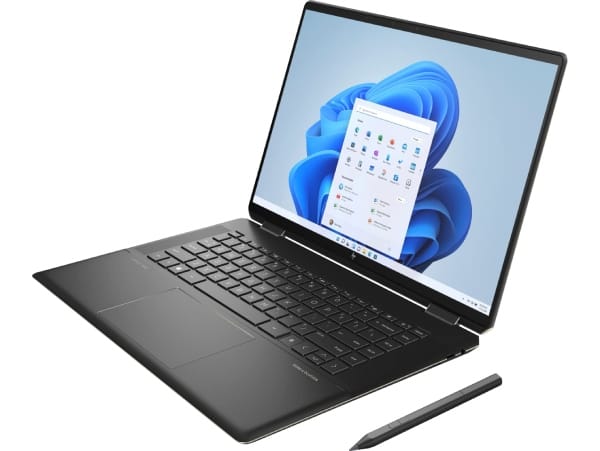
- Processor: Intel Core i9-14900H with 14 cores, enabling high-performance capabilities.
- RAM: Up to 64GB LPDDR5, catering to demanding applications.
- Storage: 2TB NVMe SSD, allowing for quick access to large datasets.
- GPU: NVIDIA GeForce RTX 4060, suitable for various machine learning tasks but may struggle with large-scale models.
- Display: 16-inch 4K OLED touchscreen (3840×2400), providing stunning visuals.
- Battery Life: Up to 14 hours, balancing performance and power.
- Pros: 2-in-1 design and excellent display quality for versatile use.
- Cons: GPU may not handle large-scale deep learning models as effectively as others.
7. Razer Blade 18
The Razer Blade 18 is a high-end gaming laptop that excels in performance, making it an excellent choice for data-heavy workloads. Its premium build quality and powerful GPU ensure that it can handle the demands of machine learning and AI projects with ease.
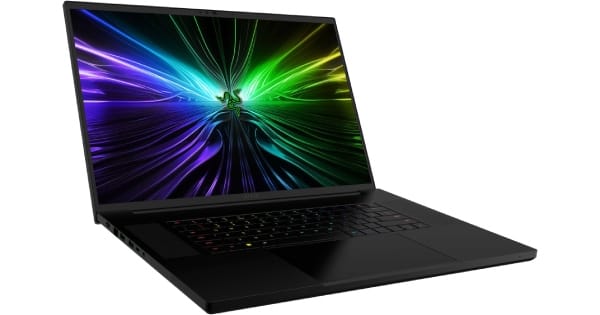
- Processor: The 14th Generation Intel Core i9-14950HX features 24 cores and can reach speeds of up to 5.6 GHz, delivering outstanding processing performance.
- RAM: Up to 128GB DDR5, supporting extensive data handling.
- Storage: Up to 4TB PCIe Gen 4 SSD, ensuring rapid data access.
- GPU: NVIDIA GeForce RTX 5090, great for heavy AI models and complex computations.
- Display: 18-inch QHD+ Mini-LED (240Hz refresh rate) for a stunning visual experience.
- Battery Life: Up to 12 hours, balancing power and usability.
- Pros: Insane GPU performance and premium build quality for demanding tasks.
- Cons: Expensive, but worth it for data-heavy workloads.
Each of these laptops represents the best laptop for big data and machine learning in 2024, catering to various needs and budgets. With powerful specifications and enhanced features, they can effectively support your data-driven projects and machine-learning endeavors.
Processor Choices
When selecting the best laptop for big data and machine learning, the choice of processor plays a crucial role in overall performance.
- Intel vs. AMD: Both Intel and AMD are competitive in performance for high-end tasks, offering processors that excel in handling complex computations and multitasking. Intel’s offerings, such as the Core i9 series, provide robust performance, while AMD’s Ryzen 9 series is known for its strong multi-threading capabilities, making either choice viable depending on user preference and specific workload requirements.
- Multi-Core Processors: Emphasizing the advantages of multi-core CPUs is vital for parallel processing. Multi-core processors enable efficient handling of simultaneous tasks, making them ideal for data-intensive applications, such as machine learning algorithms that can utilize multiple cores to speed up computation times significantly.
RAM & Storage Recommendations
In the realm of data processing and machine learning, RAM and storage are critical factors that impact system performance when selecting the best laptop for big data and machine learning.
- 32GB RAM: This is a good minimum recommendation for complex tasks, allowing users to handle moderate data processing without significant slowdowns. With 32GB of RAM, users can run multiple applications and manage medium-sized datasets efficiently on the best laptop for big data and machine learning.
- 64GB+ RAM: For larger datasets and more demanding applications, a strong recommendation is to opt for 64GB or more. This ensures smooth multitasking and the ability to work with extensive data without memory bottlenecks, providing a more responsive experience during analysis and model training on the best laptop for big data and machine learning.
- SSD Storage: NVMe SSDs are essential for speed in data retrieval and storage. Compared to traditional HDDs, SSDs offer significantly faster read and write speeds, which are crucial for handling large datasets and reducing loading times, enhancing overall workflow efficiency on the best laptop for big data and machine learning.
GPU Considerations
The graphics processing unit (GPU) is another vital component in laptops designed for big data and machine learning tasks.
- Dedicated GPUs: Their importance for deep learning tasks cannot be overstated. Dedicated GPUs, such as NVIDIA’s RTX series, are specifically designed to accelerate complex calculations involved in training machine learning models. They provide the necessary power to handle large-scale computations that would be time-prohibitive on standard CPUs, making them a crucial feature in the best laptop for big data and machine learning.
- Do You Need a GPU?: This is an important consideration, as not all machine learning tasks require a dedicated GPU. For smaller datasets and less intensive workloads, integrated graphics or lower-end dedicated GPUs might suffice. However, for extensive deep learning projects or when working with large datasets, investing in a robust dedicated GPU becomes essential to achieve optimal performance on the best laptop for big data and machine learning.
Best Laptops by Budget
When selecting the best laptop for big data and machine learning, it’s essential to consider your budget to find the best fit for your needs. For those also interested in coding, check out our comprehensive guide on the best coding and machine-learning laptops. Here’s a breakdown of options across different price ranges:
- Budget-Friendly: The Acer Swift X 14 (2024) is a solid choice for entry-level users seeking the best laptop for big data and machine learning on a budget. With its lightweight design, capable performance, and affordability, it offers a great starting point for those venturing into data analysis and machine learning without a hefty investment. It’s equipped with a decent CPU and integrated graphics, making it suitable for lighter tasks and small datasets.
- Mid-Range: The HP Omen 16 (2024) is an appropriate option for users who need more power without breaking the bank. This laptop stands out as one of the best laptops for big data and machine learning in the mid-range category. With its strong performance, dedicated GPU, and ample RAM, it strikes a balance between affordability and capability. This laptop is ideal for those working on moderate-sized datasets and engaging in more complex machine-learning tasks while maintaining budget constraints.
- Premium: The Apple MacBook Pro M3 Max (2024) rightly holds a position in the premium category, offering top-tier performance that solidifies its reputation as one of the best laptops for big data and machine learning. Its powerful M3 Max chip, extensive RAM options, and stunning display make it a favorite among professionals in data science and machine learning. While it comes with a higher price tag, the investment pays off with exceptional performance for intensive workloads.
Thermal Management
Keeping your laptop cool during demanding tasks is essential for maintaining performance and longevity. Effective thermal management systems are crucial in laptops designed for big data and machine learning. High-performance components generate significant heat, and without proper cooling solutions, throttling can occur, leading to reduced performance. Look for laptops with advanced cooling technologies, such as vapor chambers or multiple heat pipes, which help dissipate heat efficiently, ensuring sustained performance during prolonged usage. A laptop with good thermal management is vital for anyone looking for the best laptop for big data and machine learning.
Battery Life
When working on data-intensive tasks, battery life is a critical consideration, especially for those who are frequently on the move. Top picks for long battery life in this category include the Apple MacBook Pro M3 Max (2024) and the Microsoft Surface Laptop Studio 2 (2024). Both laptops are known for their excellent battery performance, making them some of the best laptops for big data and machine learning. This capability allows users to work for extended periods without needing to recharge. This is particularly important for data scientists and machine learning professionals who may work remotely or travel frequently.
Future-Proofing
As technology advances, it’s wise to consider future-proofing your investment in the best laptop for big data and machine learning. This involves staying informed about upcoming technologies and software trends in big data and machine learning. Investing in a laptop with a robust processor, ample RAM, and upgradable components can help ensure that your machine remains capable as data processing demands evolve.
Keeping an eye on industry trends, such as the rise of AI-driven analytics tools and enhanced machine learning frameworks, can guide your purchasing decisions, ensuring your best laptop for big data and machine learning remains relevant for years to come. A future-proof laptop is essential for anyone serious about using it for big data and machine learning applications.
Operating Systems
Choosing the right operating system (OS) is vital for optimizing your productivity in big data and machine learning tasks.
- Windows: Known for its compatibility with a vast array of software and tools, Windows is an excellent choice for users who require specific applications for data analysis and machine learning. Its user-friendly interface and robust support for various programming languages make it a popular option among professionals seeking the best laptop for big data and machine learning.
- macOS: The macOS environment is optimized for developers and data scientists, offering seamless integration with tools such as TensorFlow and PyTorch. It is particularly favored in creative and development circles for its stability and performance, making it a strong contender for the best laptop for big data and machine learning.
- Linux: This OS is a favorite among data scientists for its flexibility and customization options. Linux is highly efficient for running server-side applications and is often the platform of choice for advanced machine learning projects and data analysis, solidifying its position as an excellent option for those searching for the best laptop for big data and machine learning.
Conclusion
In conclusion, selecting the best laptop for big data and machine learning requires careful consideration of your specific needs, budget, and performance requirements. As you explore the diverse options available, it’s essential to evaluate factors such as processing power, RAM, storage, and GPU capabilities, all of which significantly impact your workflow and productivity.
By considering budget-friendly models like the Acer Swift X 14, mid-range powerhouses such as the HP Omen 16, or premium options like the Apple MacBook Pro M3 Max, you can find a laptop that aligns with your goals in the fields of data science and machine learning. Additionally, keeping thermal management and battery life in mind will help ensure that your laptop can handle demanding tasks effectively, even during extended work sessions.
Lastly, future-proofing your investment by choosing the right operating system; whether Windows, macOS, or Linux; will ensure that your machine remains relevant as technology evolves. By taking the time to assess these considerations, you’ll be well-equipped to choose the best laptop for big data and machine learning that meets your current requirements and supports your future endeavors in this dynamic field.


